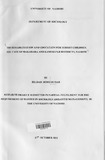| dc.description.abstract | Street children is a major social problem in the entire world practicing in the third worldwith their number increasing rapidly. The main study objective was to assess the type of services being offered in the rehabilitation centers centers including education for street children in the rehabilitation centers and the referral schools and also their performance in the referral schools. The study was an explanatory study based on a sample of street children in three referral schools and two rehabilitation centers.
Purposive sampling was used to choose the rehabilitation centers. Snow ball and Quota Sampling was used to get the respondents in Mary Immaculate Rehabilitation Center and Snow ball sampling was used to get the respondents in Bahati Rehabilitation Center. The referral schools comprised of St. Bakita, St. Elizabeth and Morisson Primary School. The study was indepth, prompting the researcher to use quantitative research method. The study sampled 50 street children in the two rehabilitation centers, 43 teachers in the referral schools, 4 Caregivers and 1 District Advisor to Schools making a total of 98 respondents. Tracer study was used to follow up rehabilitation and education for street children in the referral schools and the centers in order to eva1uate the phenomenon.
The study found out that there were structures put up by the government and the NGOs in the rehabilitation centers, Juvenile homes/Correctional centers despite the squaling conditions prompting the street children to go back to the streets. Various education approaches were used to retain street children in the schools till completion of their basic education, quality education was still lacking. As street children were integrated into the referral schools, they had a sense of belonging raising their self esteem. This enhanced competition in co curricular and curricular activities, they formed peers and bad self confidence. Rehabilitation as a service prompted responsible behavior and refrained them from substance abuse. Vocational training made learners to acquire skills to make a living which would later help them in the job market. | en_US |

